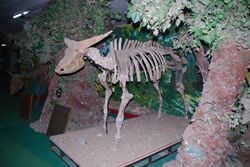Biology:Bubalus wansijocki
| Bubalus wansijocki Temporal range: Late Pleistocene
| |
|---|---|

| |
| Skeleton of Bubalus wansijocki | |
| Scientific classification | |
| Domain: | Eukaryota |
| Kingdom: | Animalia |
| Phylum: | Chordata |
| Class: | Mammalia |
| Order: | Artiodactyla |
| Family: | Bovidae |
| Subfamily: | Bovinae |
| Genus: | Bubalus |
| Species: | †B. wansijocki
|
| Binomial name | |
| †Bubalus wansijocki Boule & Chardin, 1928[1]
| |
Bubalus wansijocki (sometimes misspelled Bubalus wansjocki) is an extinct species of water buffalo known from northern China during the Late Pleistocene.
A 2014 study on extinct Chinese buffalo species indicates that the related Bubalus fudi is a subspecies of B. wansijocki.[2]
Paleoecology
Many of the faunal assemblages associated with Bubalus wansijocki indicate that it lived in a relatively warm and moist environment, with a mixture of grassland, forest and swamp.[3] However, the period it lived in was associated with a cold environment and other assemblages its remains have been found in show it and other warm-adapted animals together with cold-adapted ones. It is now believed that northern China went through many short, abrupt periods of very warm and very cold climate change during the Late Pleistocene.[4][5]
References
- ↑ "Bubalus wansijocki". http://www.fossilworks.org/cgi-bin/bridge.pl?a=taxonInfo&taxon_no=162459.
- ↑ Wei, Dong (2014). "The Early Pleistocene water buffalo associated with Gigantopithecus from Chongzuo in southern China". Quaternary International 354: 86-93. doi:10.1016/j.quaint.2013.12.054.
- ↑ Li, Liu (2005). The Chinese Neolithic: Trajectories to Early States. Cambridge University Press. p. 60. ISBN 9781139441704.
- ↑ Jingxing, L. (2013). "Three abrupt climatic events since the Late Pleistocene in the North China Plain". Journal of Palaeogeography 2 (4): 422-434. doi:10.3724/SP.J.1261.2013.00040.
- ↑ Zhisheng, An (2014). Late Cenozoic Climate Change in Asia: Loess, Monsoon and Monsoon-arid Environment Evolution. Springer Netherlands. pp. 277-278. ISBN 9789400778177.
Wikidata ☰ Q105491079 entry

